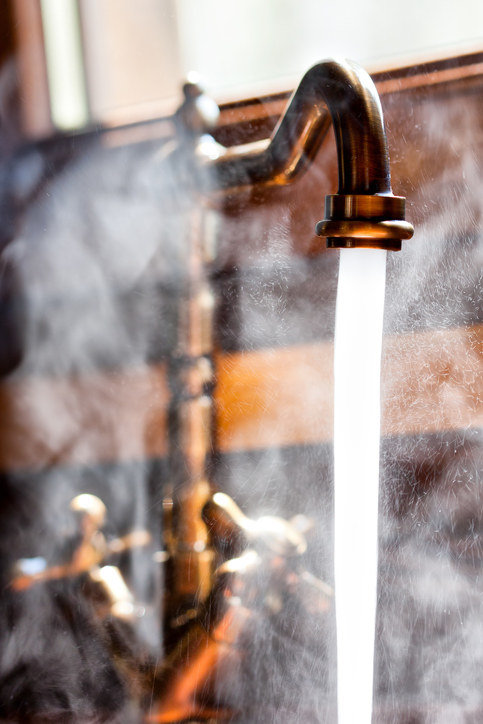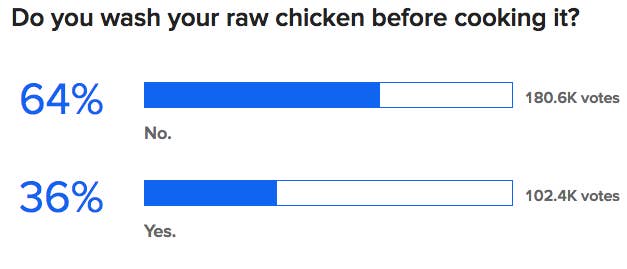Many home cooks wash raw chicken under running water before cooking it. But new advice from health and food safety experts says that rinsing or washing raw poultry is not needed and may even make you more likely to get sick from food.
Why Do People Rinse Raw Chicken?
There are a few common reasons why someone may choose to rinse or wash raw chicken before cooking:
-
To remove blood slimy residue, or other visible contaminants from the surface of the meat. Some find these aesthetically unappealing.
-
A belief that rinsing will help remove bacteria like salmonella from the chicken
-
A habitual practice passed down from older family members or cooking traditions.
-
To rinse off any odors from the packaging or processing,
While these reasons are understandable, experts advise against washing for safety reasons.
Potential Risks of Rinsing Raw Chicken
While rinsing chicken may seem harmless, it can actually increase the risk of cross-contamination in the kitchen. Here’s why:
-
Bacteria Can Spread—The surface up to 3 feet away from the sink, countertops, and splashing water from the tap can get bacteria from the raw chicken. Any germs that are in the chicken juices can spread very quickly and easily.
-
Does Not Get Rid of Bacteria—Washing raw chicken does not get rid of or kill pathogens like salmonella. These bacteria can get into the meat all the way through, not just on the outside. Rinsing cannot remove the bacteria present internally in the tissues.
-
There Is a Chance of Recontamination—Even after washing, the chicken can get bacteria from kitchen surfaces again if it touches those areas again before cooking.
According to the U.S. Department of Agriculture (USDA), the only way to fully kill foodborne pathogens like salmonella is through proper cooking. Washing with water alone cannot fully disinfect raw chicken.
Expert Recommendations Against Washing
Due to these risks, health and food safety organizations uniformly recommend against washing raw chicken. These include:
-
USDA – The USDA’s current recommendation is that washing or rinsing raw poultry is not recommended. This includes in the sink, or via methods like soaking in vinegar solutions.
-
FDA – The U.S. Food and Drug Administration (FDA) also advises against rinsing raw chicken or other poultry. It cites the risk of cross-contamination to sinks and counters.
-
CDC – The Centers for Disease Control and Prevention (CDC) warns against washing poultry, and notes it offers no benefit in killing germs. Only proper cooking can kill foodborne pathogens.
-
National Sanitation Foundation (NSF) – The public health organization NSF International also advises against washing raw chicken for food safety reasons.
-
UK Food Standards Agency – In the United Kingdom, the Food Standards Agency has warned against washing poultry, citing risks of campylobacter bacteria spreading in kitchens.
With numerous health organizations aligned on updated food safety guidance, most experts today recommend skipping rinsing altogether.
Safer Alternatives to Washing Chicken
Rather than rinsing raw poultry, experts recommend these safer options to help reduce foodborne illness risks:
-
Use a Clean Work Surface – Always prepare chicken on a clean, sanitized cutting board and work surface that hasn’t touched other foods. This prevents cross-contamination.
-
Use Separate Utensils – Use a clean knife and utensils just for handling the raw chicken. Don’t reuse them for cooked chicken or other foods without washing first.
-
Wash Hands Before and After – Be diligent about hand washing before and immediately after handling raw chicken. Lather with soap for 20 seconds.
-
Cook Thoroughly – Cook chicken to an internal temperature of 165°F as measured by a food thermometer. This kills any potentially harmful bacteria present.
-
Refrigerate Promptly – Refrigerate or freeze chicken within 2 hours of purchasing. Store in sealed packaging at 40°F or below.
The Takeaway
While rinsing raw chicken was once recommended, updated guidance now advises against this practice. Washing raw poultry under running water can easily spread bacteria around the kitchen. Instead, experts recommend skipping the rinse and focusing on proper handling, cooking, and storage. With safe food preparation habits, raw chicken can be handled safely and cooked to eliminate foodborne pathogens.
:max_bytes(150000):strip_icc()/GettyImages-922708144-ac26bef0954747e09323f66ac9f1c77e.jpg)
So, who’s actually in the right, hygiene-wise? To get to the bottom of this question, I decided to ask the experts.

Hello! My name is Michelle, and I’m a writer for BuzzFeed Food. During a scroll through the comments on one of our videos, I noticed a ton of people saying they wash their chicken before cooking it.

Why You Should Not Wash Meat or Poultry
FAQ
Should I rinse chicken before cooking?
No, it’s not recommended to wash chicken meat before cooking. Washing raw chicken can spread bacteria around your kitchen, increasing the risk of foodborne illness. Cooking chicken to the appropriate internal temperature (165°F or 75°C) effectively kills any harmful bacteria, making washing unnecessary.
Do professional chefs wash their chicken?
Professional cooks and chefs generally do not wash meat before preparing it. The main reasons for this are: Cross-Contamination Risk: When you wash meat, bacteria can splash onto other foods, surfaces, and utensils nearby, making the risk of cross-contamination higher.
Should you soak raw chicken in water?
Don’t: Rinse chicken before cooking. Rinsing or soaking your chicken will not kill bacteria. Doing so may cause bacteria to contaminate your work surface, utensils, sink, or other food. Do: Pat chicken dry with paper towels.
Does the FDA recommend washing chicken?
Do not rinse raw meat and poultry before cooking. Washing these foods makes it more likely for bacteria to spread to areas around the sink and countertops. Jan 31, 2025.
